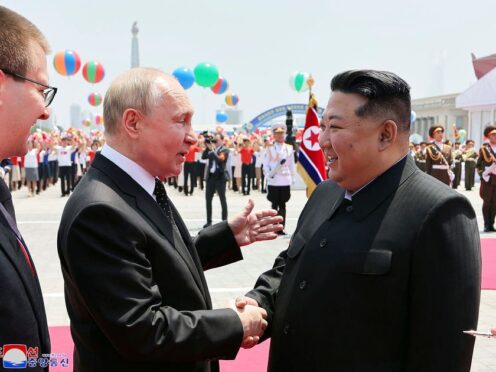An agreement between Russia and North Korea requires both countries to use all available means to provide immediate military assistance in the event of war, according to North Korean state media.
Both North Korea’s Kim Jong Un and Russia’s Vladimir Putin had described the deal, reached at a Pyongyang summit on Wednesday, as a major upgrade of bilateral relations, covering security, trade, investment, cultural and humanitarian ties.
The North’s official Korean Central News Agency (KCNA) said on Thursday that Article 4 the comprehensive strategic partnership agreement states that if one of the countries gets invaded and is pushed into a state of war, the other must deploy “all means at its disposal without delay” to provide “military and other assistance”.

The summit between Mr Kim and Mr Putin came as the US and its allies expressed growing concern over a possible arms arrangement in which Pyongyang provides Moscow with badly needed munitions for its war in Ukraine, in exchange for economic assistance and technology transfers that could enhance the threat posed by Mr Kim’s nuclear weapons and missile program.
Following their summit, Mr Kim said the two countries had a “fiery friendship” and that the deal was their “strongest-ever treaty,” putting the relationship at the level of an alliance.
He vowed full support for Russia’s war in Ukraine. Mr Putin called it a “breakthrough document” reflecting shared desires to move relations to a higher level.
North Korea and the former Soviet Union signed a treaty in 1961, which experts say necessitated Moscow’s military intervention if the North came under attack.
The deal was discarded after the collapse of the USSR and replaced in 2000 by one that offered weaker security assurances.
A full day after the summit, South Korean officials said they were still interpreting the results, including what Russia’s response might be if the North comes under attack.
Analysts were mixed on whether the agreement obligates Russia to an automatic military intervention on behalf of the North in war situations or was carefully worded enough to avoid such a commitment.

It also was not immediately clear why the article invokes the UN Charter.
“We are currently reviewing the specifics of the treaty signed between Russia and North Korea during President Putin’s visit to North Korea. We will announce our government’s position after we are done,” Lim Soosuk, South Korea’s Foreign Ministry spokesperson, said during a briefing.
Still, Lim expressed regret that Moscow and Pyongyang signed the agreement while openly talking about military and technology co-operation that would be in violation of UN Security Council resolutions.
“Based on our close analysis and assessment of the results of (Mr Putin’s) visit, including the comprehensive strategic partnership treaty signed between Russia and North Korea, we will work with the international community, including our allies and friends, to take correspondingly stern and decisive measures to any actions that threaten our security,” Lim said.
The deal was made as Mr Putin visited North Korea for the first time in 24 years.
Their visit showcased their personal and geopolitical ties, with Mr Kim hugging Mr Putin twice at the airport, their motorcade rolling past giant Russian flags and portraits of Mr Putin, and a welcoming ceremony at Pyongyang’s main square attended by what appeared to be tens of thousands of spectators.

According to KCNA, the agreement also states that Pyongyang and Moscow must not enter into agreements with third parties if they infringe on the “core interests” of another and must not participate in actions that threaten those interests.
KCNA said the agreements require the countries to prepare joint measures to strengthen their defence capabilities, prevent war, and protect regional and global peace and security. The agency did not specify what those steps are or whether they would include combined military training and other cooperation.
The agreement also calls for the countries to actively cooperate in efforts to establish a “just and multipolar new world order,” KCNA said, underscoring how the countries are aligning in the face of their separate, escalating confrontations with the United States.

In recent months, Mr Kim has made Russia his priority as he pursues a foreign policy aimed at expanding relations with countries confronting Washington, embracing the idea of a “new Cold War” and trying to display a united front in Mr Putin’s broader conflicts with the West.
Tensions on the Korean Peninsula are at their highest point in years, with the pace of both Mr Kim’s weapons tests and combined military exercises involving the US, South Korea and Japan intensifying in a tit-for-tat cycle.
The Koreas also have engaged in Cold War-style psychological warfare that involved North Korea dropping rubbish on the South via balloons and the South broadcasting anti-North Korean propaganda with its loudspeakers.
